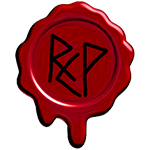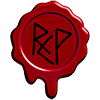In Conversation with Kai Coggin
Billy Lezra

While the world is on lockdown, Kai Coggin casts a poetic spell across screens. “In case you are out there and you are going through this alone, I want to do this for you.” She raises her left hand and moves it toward the webcam. She pauses, eyes bright with affection. “Go ahead. Put your hand up to it.” I raise my hand to touch hers.
“You’re not alone through this. We are all connected, and we’re going to make it through this. In the meantime, let’s get to some poetry.”
Tonight I am a virtual audience member watching the one thousand six hundred and twenty sixth (1,626) consecutive weekly open mic session of Wednesday Night Poetry, a project poet Bud Kenny founded in 1989. Usually the poets meet in person; since COVID-19, Kai is hosting it virtually to keep the streak alive. If you are a poet and want to share some of your work (or a happenstance audience member, like me) this is where you can find the beautiful display of community: WNP Virtual Open Mic: Poetry Through The Pandemic.
I wrote to Kai because I wanted to understand the alchemy of a spirit that compels others to meet her hand through screens, to be vulnerable, to show up for other humans like this.
We meet over FaceTime, both dressed in blue. Sitting outside her home in Hot Springs National Park, Arkansas, she explains that she started writing when she moved from Thailand to the United States at seven. Her parents divorced. She missed her dad. “I wonder if he is thinking about me,” she wrote to herself in a little journal.
She graduated college with a degree in poetry and creative writing, earned a teaching certification, and taught high school English in Houston, where she grew up. For “Romeo and Juliet” she built a balcony on a table in her classroom with foam boards and fake flowers; for Lord of the Flies, she took her students outside to read and gave them aluminum spears.
Her eyes dance the more she talks about teaching.
“How much time do you have?” she asks.
“A lot,” I say.
“Okay.” She smiles. “Because this is a cool story.”
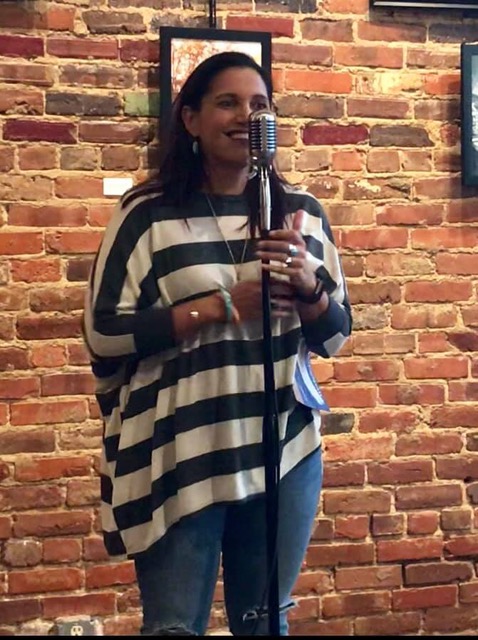
During her fourth year teaching, Coggin led a poetry unit and projected Sandra Cisneros’ “Loose Woman” onto the whiteboard. “This poem is all about stereotypes and if anyone knew about unjustified stereotypes, it was my students.
They groaned when I said we were going to analyze this poem together, but when we read it, something happened that I didn’t expect—engagement.”
(excerpt)
I’m an aim-well,
shoot-sharp,
sharp-tongued,
sharp-thinking,
fast-speaking,
foot-loose,
loose-tongued,
let-loose,
woman-on-the-loose
loose woman.
Beware, honey.
I’m Bitch. Beast. Macha.
¡Wáchale!
Ping! Ping! Ping!
I break things.
The students were enthralled and connected.
Coggin asked them to write their own poems to subvert the stereotypes that had been imposed onto them, just like Cisneros. The project electrified them.
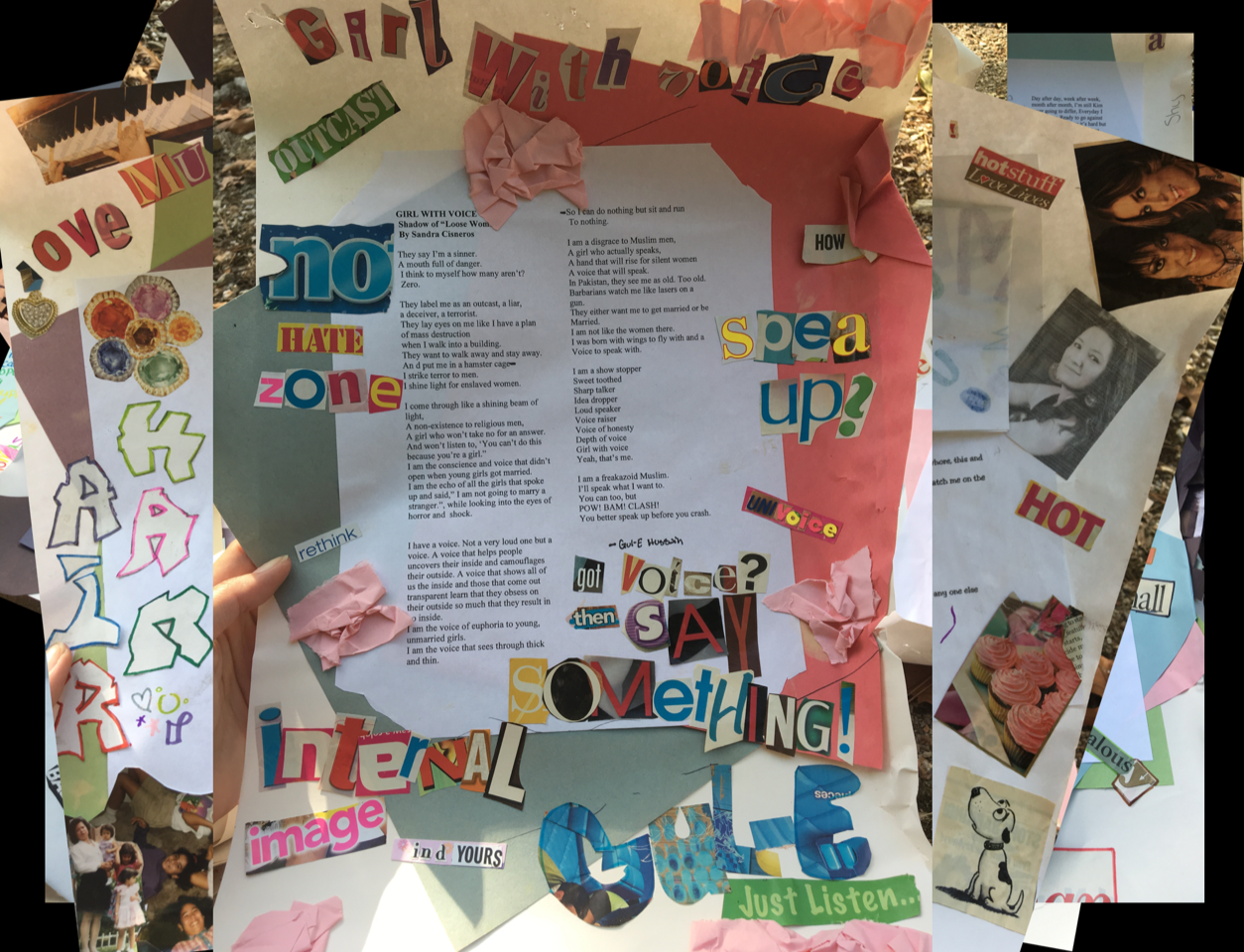
After poetry came the persuasive writing unit. This time Coggin had her students write letters to Sandra Cisneros herself. They asked her to come to their Houston high school to read “Loose Woman.” For many, it was the first time they signed a business letter with their signature. Coggin wrote one, too. She then found the address of Cisneros’ agent and placed each printed letter with each poem on the back. She sent 200 letter/poems from Houston to New York City.
“What did you hear and what did it sound like?” I scrawl in my notes while Coggin talks because to my ears what she describes transcends intuition. She must have heard something, a bell, a whistle, a verse, shoot-sharp, sharp-tongued, sharp-thinking, fast-speaking. How does one know when to put poems in a box?
A month later, after Christmas break, Coggin returned to her classroom to an email from Cisneros.
Her agent received the box of poems, read a few, and boarded a plane to hand-deliver it to Sandra in San Antonio.
Here Coggin mentions timing. “Sandra had been in a grief spiral. Her mother had just died. She wasn’t writing. And out of the blue a box of 200 poems and letters appear that affirm her impact as a writer. It was like a lightning bolt, a sign. She wanted to meet the kids who wrote so raw and real.”
The day Sandra visited the school, Coggin asked her students to dress in their Sunday best.
“They wore little neckties and dresses, and brought home-cooked dishes that represented their cultures. I rented the computer lab for the day and got them out of all their classes.
They read their poems to Cisneros. Sandra read “Loose Woman” to them. It was a beautiful culmination. Divine.
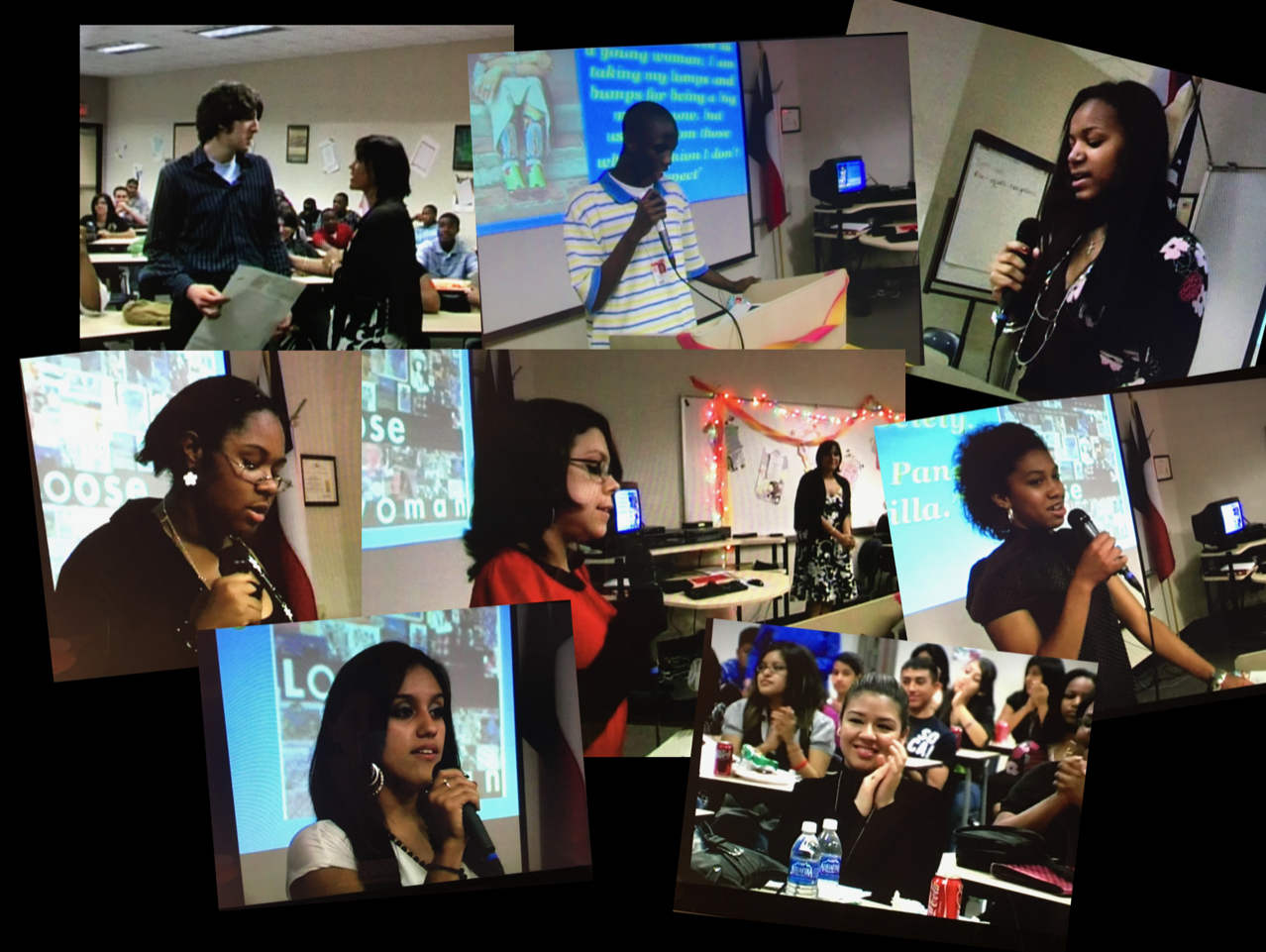
There was a film crew that captured the whole thing. Cisneros even brought 200 copies of her new novel, Caramelo, and signed books for each student.
She cried. For most of the kids, this was the first hard-back book they could call their own.”
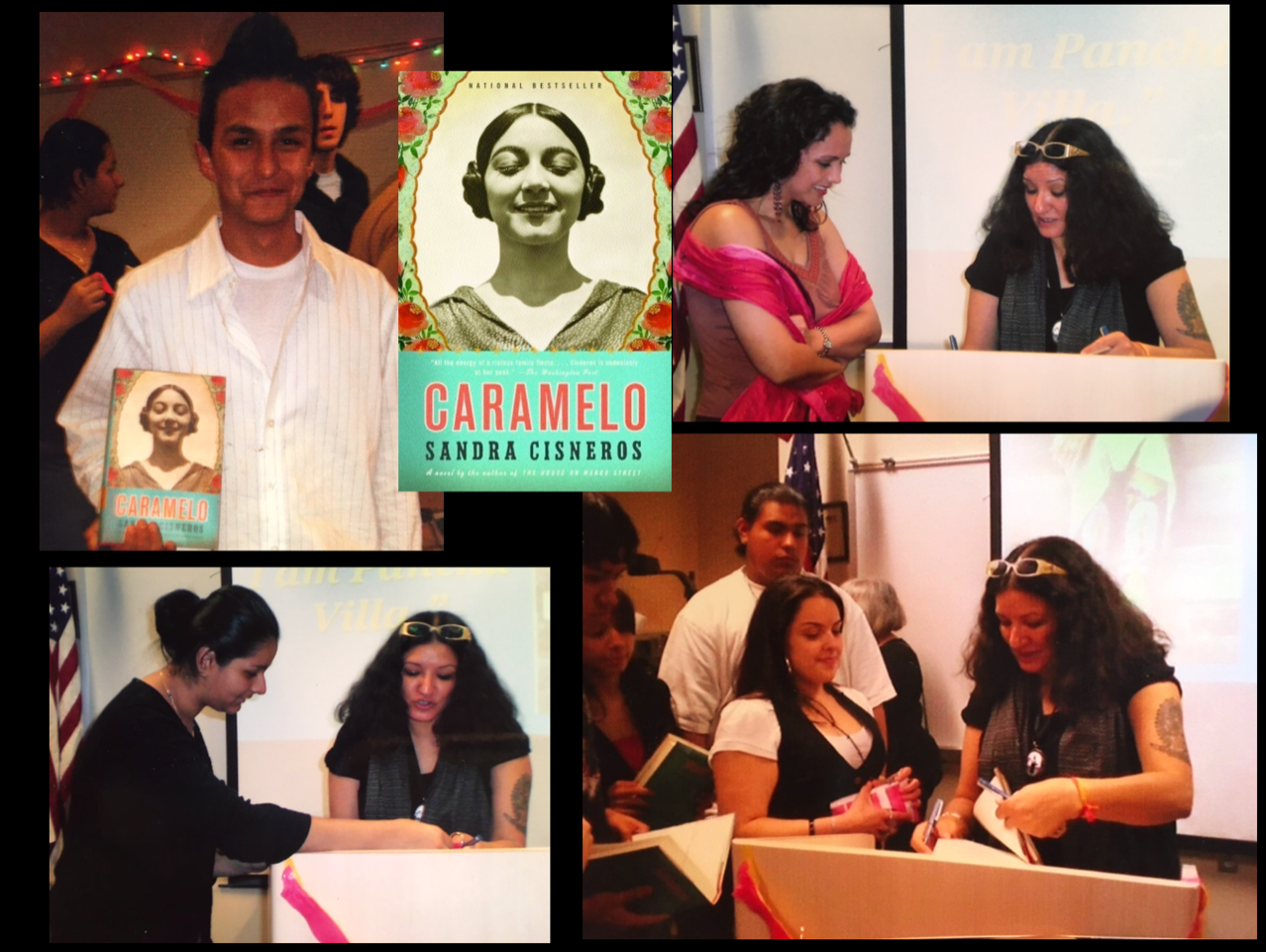
“Are you crying?” Coggin asks me while I blink fast and hope she doesn’t notice over pixelated Facetime. She notices.
“Yeah, dude! That shit is so wild!” I say, embarrassed.
She smiles and laughs big. “No, dude. Wait for it.”
She tells me that Cisneros recognized the poet in her. She invited Kai to her San Antonio writer’s workshop MACONDO, and to her famous pink house. That night she cooked her quesadillas and they shared a corona in her kitchen amidst the walls draped with Mexican folk art.
Eventually Sandra wrote a blurb for Kai’s first full-length collection PERISCOPE HEART calling Coggin’s poetry “spells, chants, prayers, invocations… work of the spirit, illuminations like desert thunder and a night sky of benedictions.”
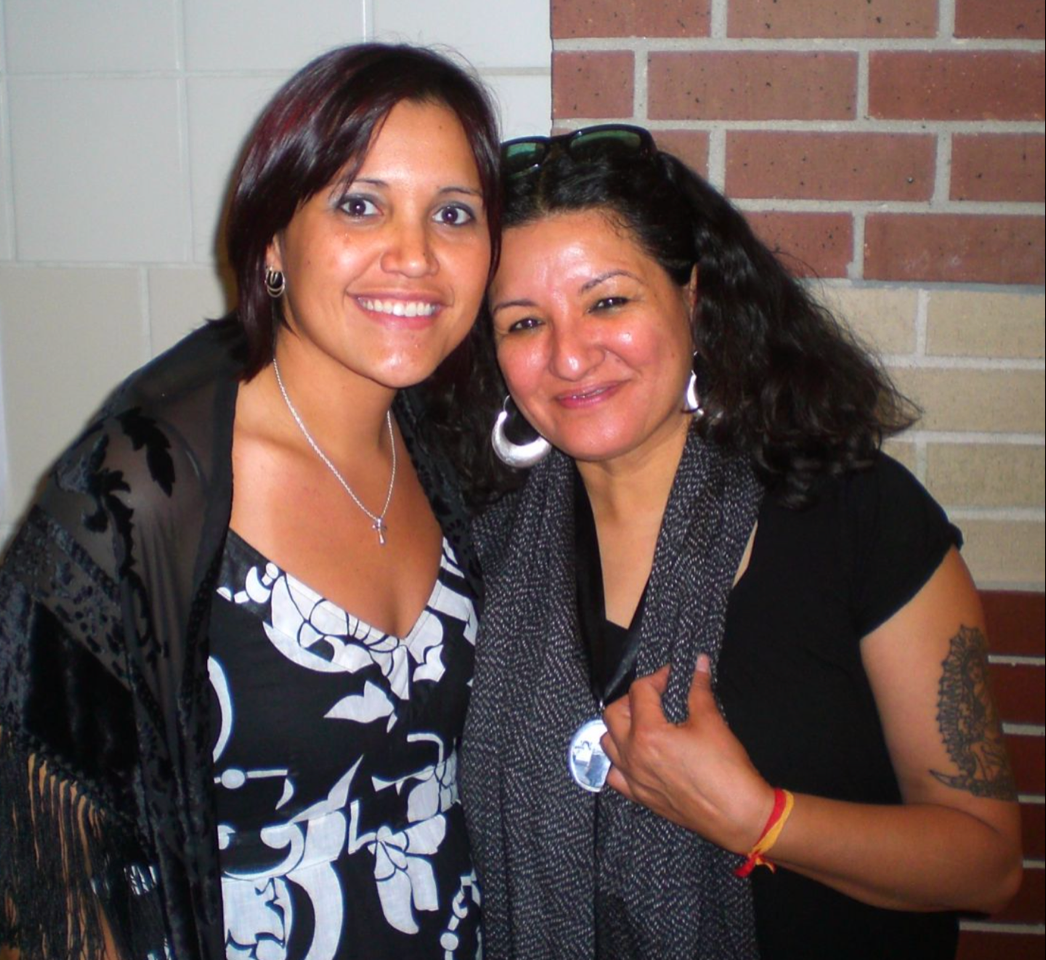
What began as a poem on the whiteboard moved through time and transfigured into Sandra Cisneros herself in the classroom. “And that’s why I stopped teaching,” Coggin says.
“The impact of poetry was undeniable. I saw its power and observed what it did for my kids in Houston. These ‘thugs’ (as society calls them) brought Sandra Cisneros to their classroom. It gave them so much faith in their own words. The thing I’d put on the back burner resurfaced and put itself magically on the frontburner. Poetry.”
That year, Kai was named a finalist for Regional Teacher of the Year, out of 85,000 teachers in the city of Houston.
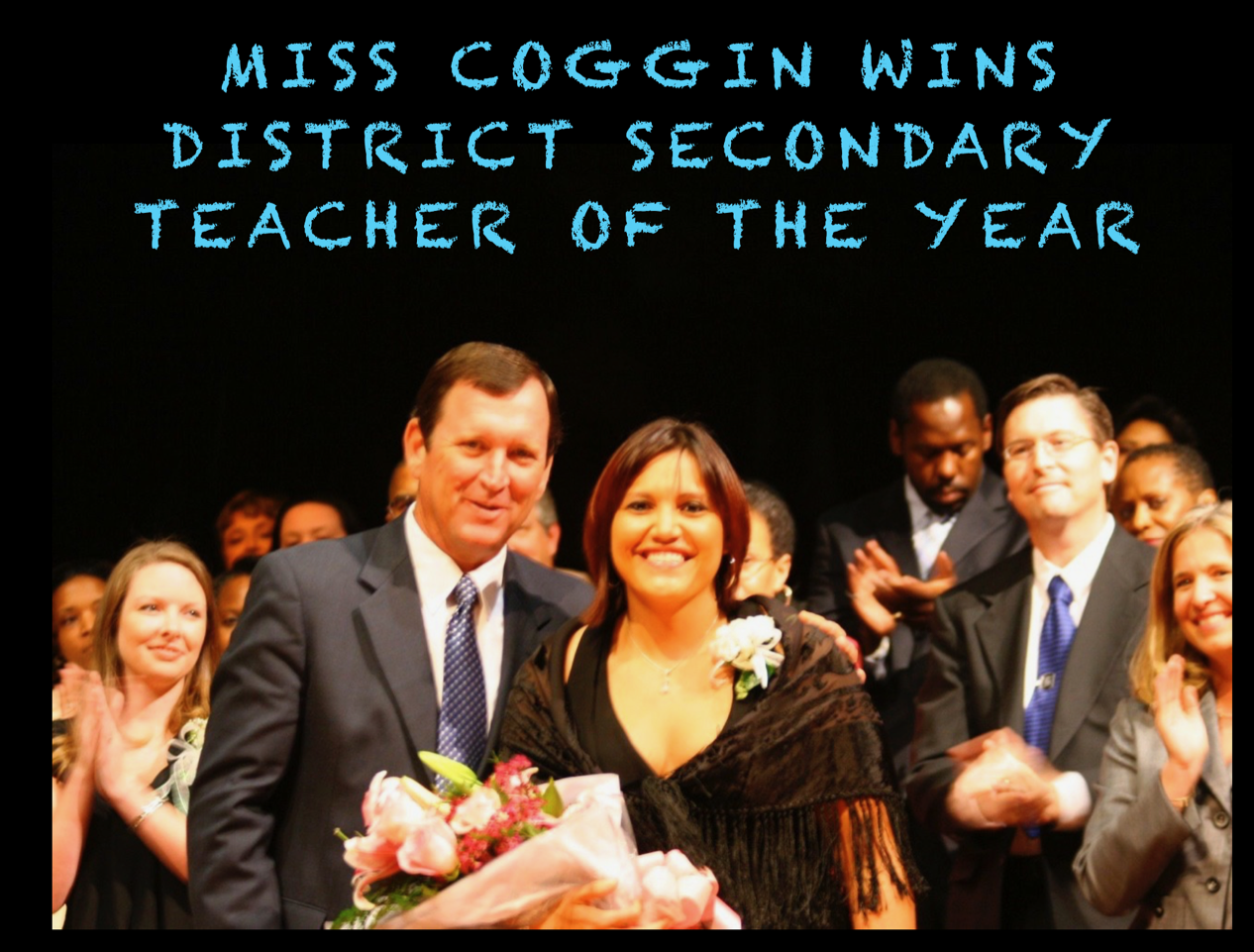
“Poetry was calling me.
I told my kids I had a dream to chase, and they cheered me on. My partner Joann always encouraged my creativity, and gave me the support to take a huge risk in leaving my stable job and great salary. We left Houston and moved to Arkansas. And here, I’ve been able to just focus completely on writing. Nature is so conducive. Joann is a painter. She is a master naturalist who ushers in all the birds and flowers I observe. I turn them into poems. I do the shoveling; she plants the seeds. She’s blowing a kiss at me right now.”
She looks up with a huge smile and waves.
Coggin later sends me a close-up picture of Joann whose blue eyes are fixed on a hummingbird in flight one foot away from her face. The adoration shimmers between photographer and subject, subject and tiny bird.
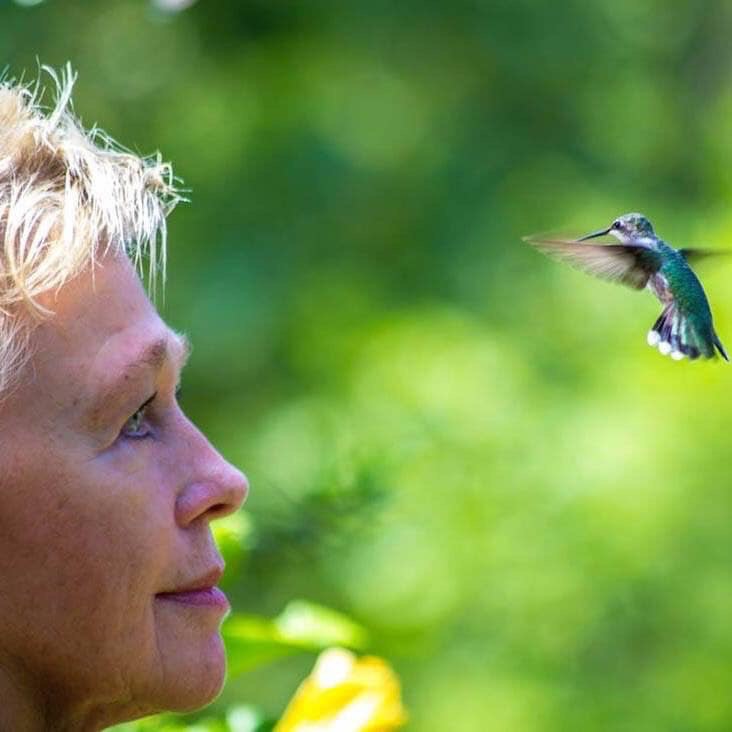
kai coggin
How would you describe your creative process?
When my heart fills up and I can’t hold something in there anymore, I write. When my heart breaks for some cruel injustice, I write. When my heart longs, I write. When my heart is bursting with love or sex or joy or transcendence, I write. I have no real process, I guess, no rigorous schedule of drafting and editing, if I think about it. I go with the flow of the infinite swirling around me. For lack of a better metaphor,
I make myself an instrument of the cosmos, letting energy move through me into poetic form. I transcribe the human experience, the humble path of the seeker, the pitfalls and the triggers, the defeats and victories of attaining self-awareness.
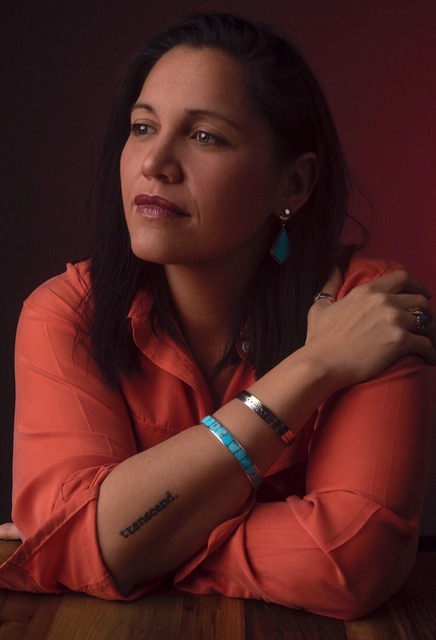
I used to write in the morning, when my love and our two pekingese Genghis & Layla were still sleeping. It was my church, my coming to self, my reflection, and meditation, and searching. I would find poems in the morning news, the way the world woke up in stories. I would dig for meaning, for the divine traces in random facts and articles. Once a poem came from the fact that parrotfish poop creates all the white sand on the beaches in the world.
This is sort of like mining for stardust amidst the rubble of the world, an exercise in wonder, revealing the esoteric in the ordinary.
Sometimes a phrase or an image will strike me and I will turn it over and over in my head, knowing there is a poem there. It will marinate and I will ruminate on it until it finds its cling into the tangible, until I find a way to voice the beauty or tragedy of it into poem.
Lately though, I have emerged as a Warrior Poet.
In the last few years after the 2016 election, things are just too volatile, too much daily travesty to digest, too much innocence robbed and too much light snuffed out by greed and evil. My peaceful morning respite into poetry has become a fiery necessity to illuminate the injustices that are unfolding daily in the world, to call out the violators of goodness.
My creative process follows the battle now. My poet warrior cry rises almost daily to fight with my words, whether it is on a FB post, on a mic, in a classroom, in a poem. Inside, I am writing the poem of myself, and how I can stand as Light in the unfolding darkness and chaos of our times. That is my purpose— my church, my coming to self, my reflection, and meditation, and searching. To be Light. To be INCANDESCENT.
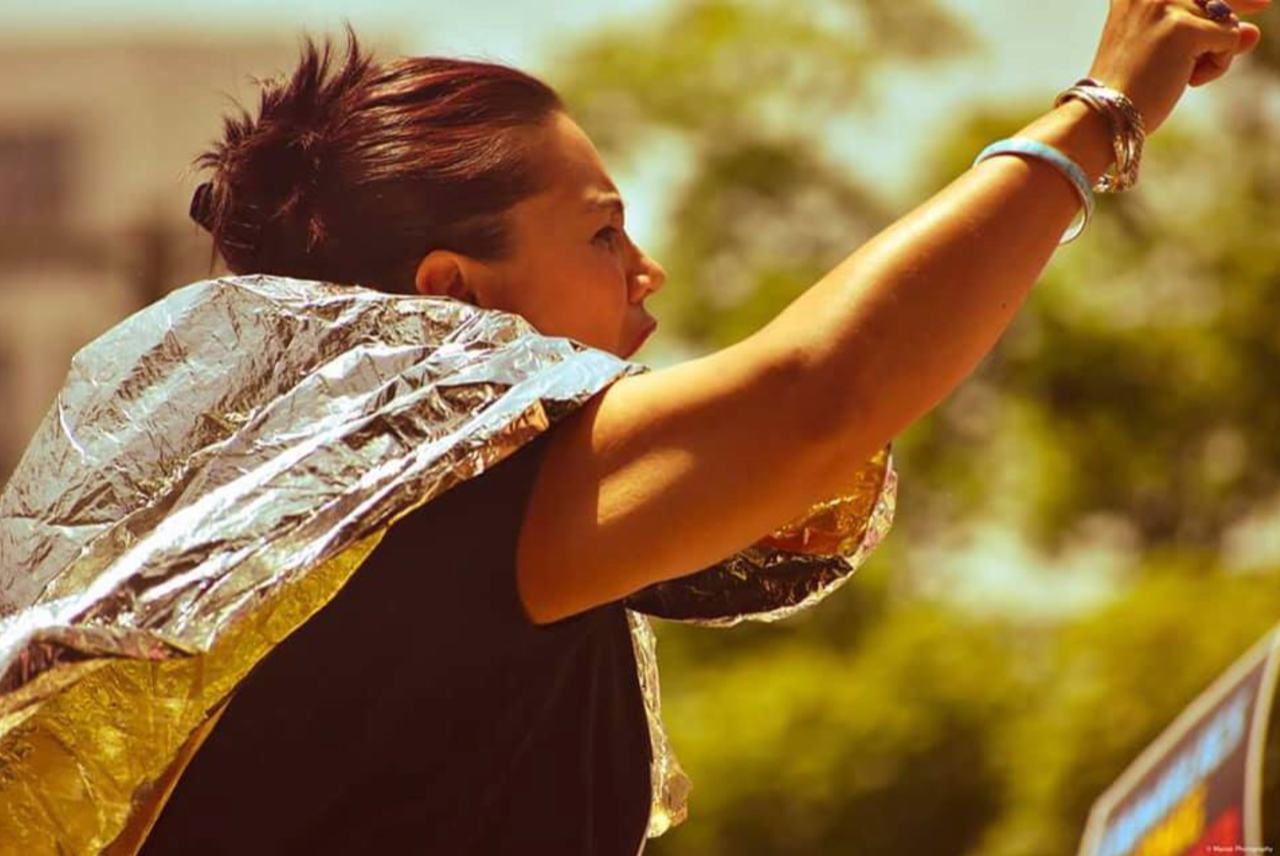
I am struck by the ways in which the titles of your bodies of work speak to each other and move into flight and fire: PERISCOPE HEART into WINGSPAN, to SILHOUETTE and finally INCANDESCENT. How would you describe your artistic trajectory since you published PERISCOPE HEART?
PERISCOPE HEART was my first step into the world poetically. My spirituality and soul-striving and body image and love and life are seen through the eyes of my heart.
When I see through the eyes of my heart, it acts as a periscope wherein it “lifts me” above and over the physicality of the mundane human existence, and sort of puts me in this higher sphere.
That was an image that kept coming to me as I compiled that first manuscript.
With WINGSPAN, I was wide open, feeling everything through and through. I felt as though I was soaring in my creativity and purpose. And the cool thing about this book is when you open the book, THE WINGS OPEN. I always tell my audiences and classes that when I do a reading or teach a class of kids. I open the book, and show them the neat visual trick, and usually they are quiet. Then I say, ‘oh come on, isn’t that cool? Can I get a little more reaction, some oooohs and ahhhhs, a whoa oh my god! Ok, rewind, let’s try it again, okay?’ Then I spin around and I do the whole thing again— ‘and the cool thing about THIS book, is when you open the book, THE WINGS OPEN!’ And they scream and holler and clap and ooh and ahhh. I make them oooh and ahh. It’s super corny as hell, but breaks the ice. I even did it in Chicago featuring at The Green Mill for 300 people and in NYC when I was book touring. Joann was like don’t do the wing thing in New York, don’t do the wing thing… but I did the wing thing, and it killed.
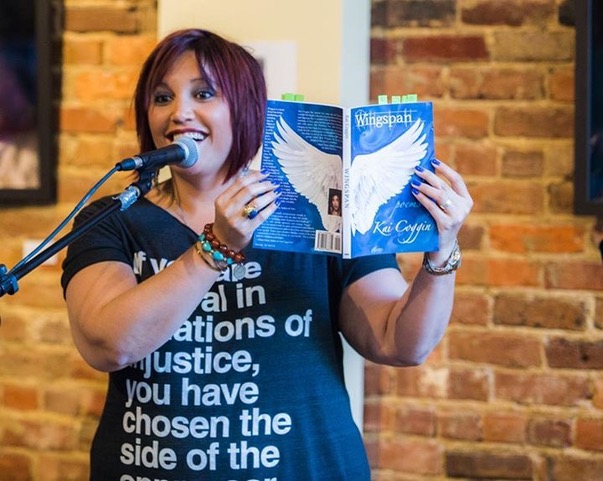
SILHOUETTE is a spoken word album I produced in GarageBand. I recorded readings of 17 poems, and asked my musician friends across the country to play their original sounds in the background as they listened. It meshed all so beautifully, and I proved to myself that I can do anything I earnestly set out to do.
With INCANDESCENT…the world is dark. Incandescent is my beauty and battle cry.
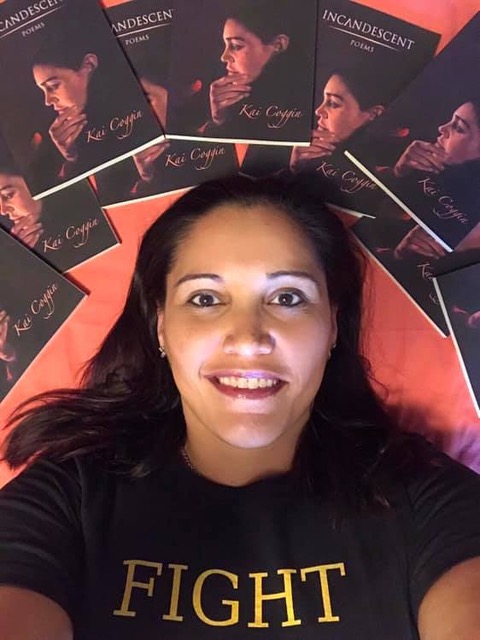
(excerpt)
… glowing
growing
giving off light
light
light
in whatever form
I can
incandescent
means
emitting light as a result of being heated
and isn’t everything heated
and isn’t everything shamefully ablaze
and isn’t everything burning before us
and isn’t the whole wide world turning to ash
can we still find the light in all that is being lost
can we still project a vision that leads humanity forward
can we still search out beauty in the rubble
can we still shine amidst the trouble
can we name ourselves luminous
and believe it
we must
we do
if you recognize this is how you move through life
you are incandescent, too.
What would you say to someone who doesn’t think their words matter?
Your words matter to me.
Do you ever miss teaching?
For the last four years, I have worked with the Arkansas Arts Council and Arkansas Learning Through the Arts, as a Poetry Teaching Artist.
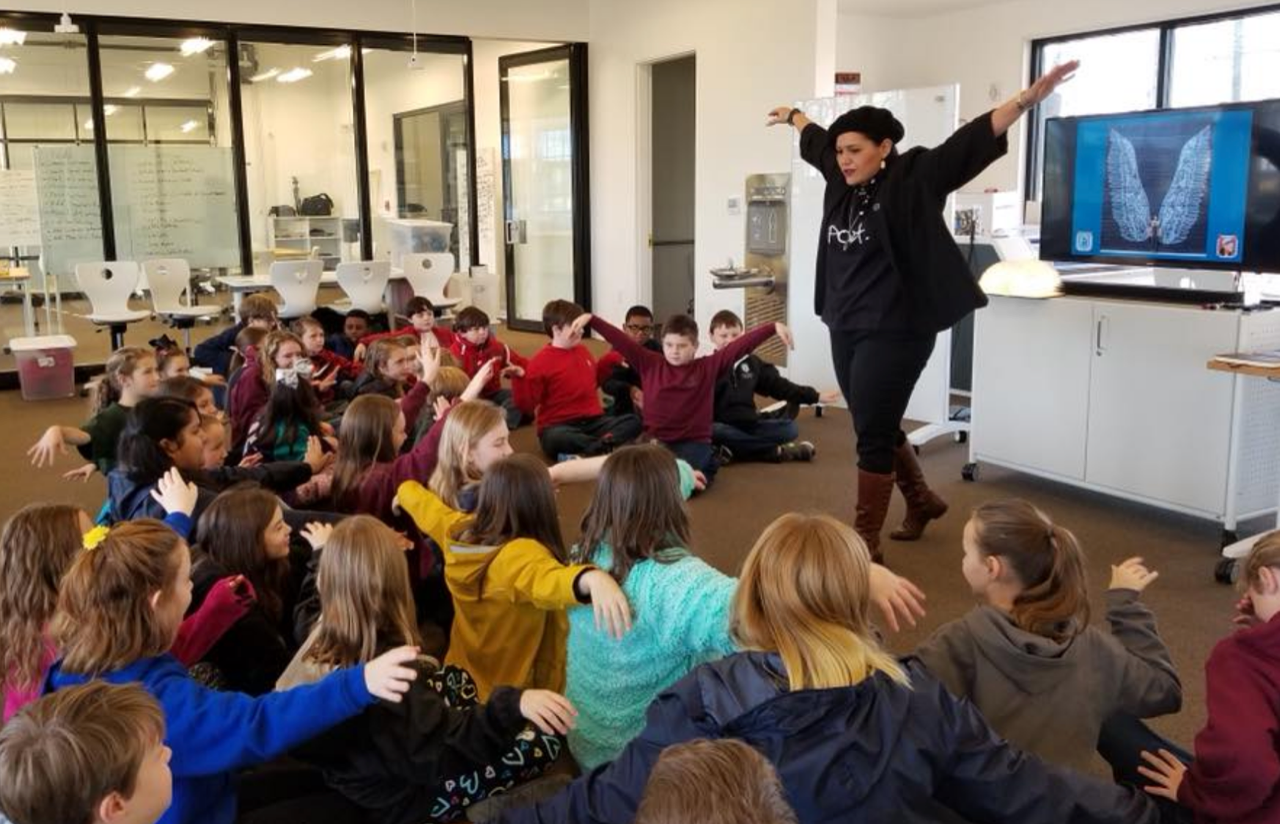
I get to bounce around to these different schools and show students that they can actually have a career as an artist. You can be a dancer, or a painter, or a poet, like me. You can write about all the experiences you are going through. Poetry is a safe place for your feelings. In every classroom, that is my mantra:
POETRY IS A SAFE PLACE FOR YOUR FEELINGS.
And they see they are safe with me; their words, their stories, their hearts. Safe.
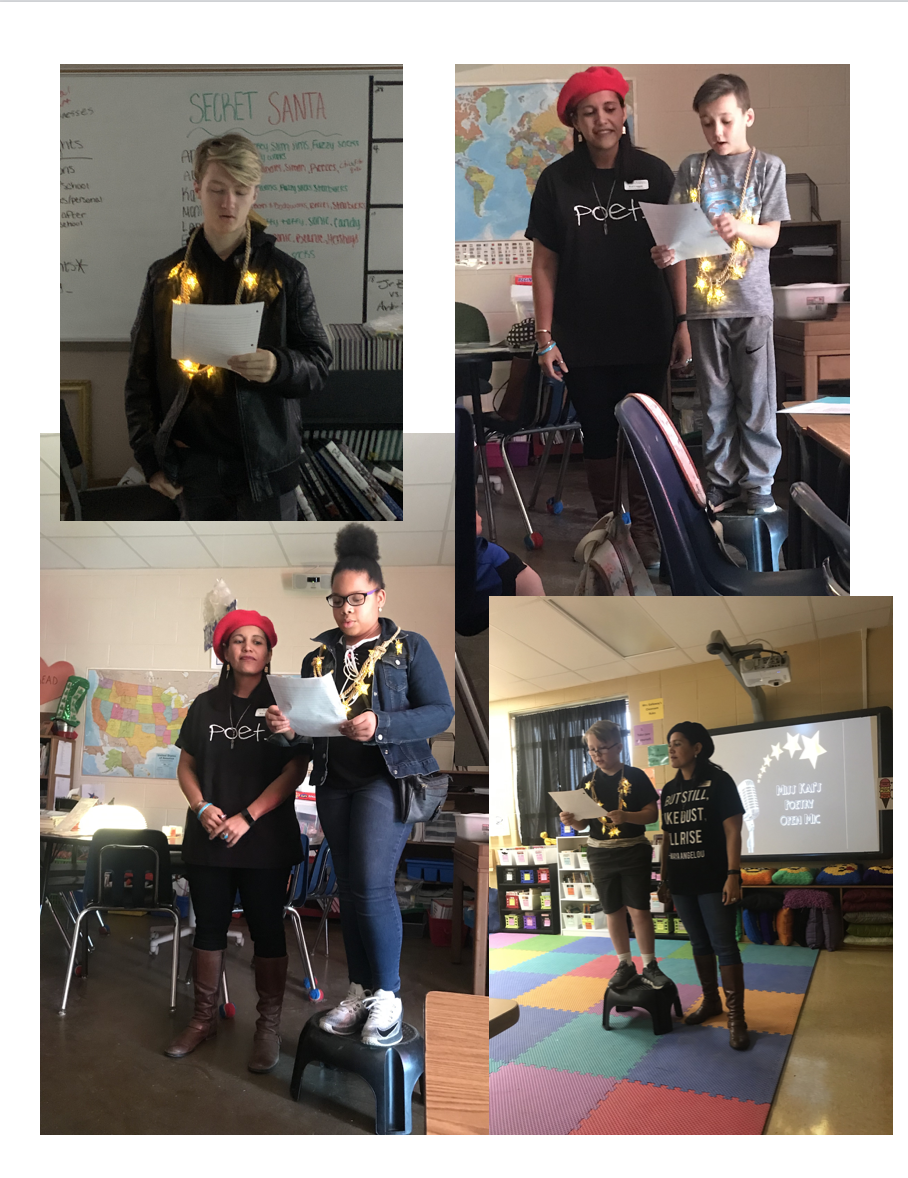
I try to be that person who comes in like a lightning bolt of hope to classrooms that are forgotten, like in rural Arkansas or in the Delta.
Arkansas has some of the highest rates of poverty and PTSD in children. I give them a way to express that. A window. I bring in poems that engage the students with their relevance. Kids and teens are inundated with poems written by the “old dead white guys” of the literary canon. I always tell them “I am not going to read poems by old dead white guys: the poems we are going to read are written by your reflections.” Poets of color. Rural poets. If I have a class of mostly Latinx students, we read Latinx poets who are writing TODAY. They can see that their lives, too, can transmute into poetry, and all of a sudden these kids have a new tool they can use for the rest of their lives.
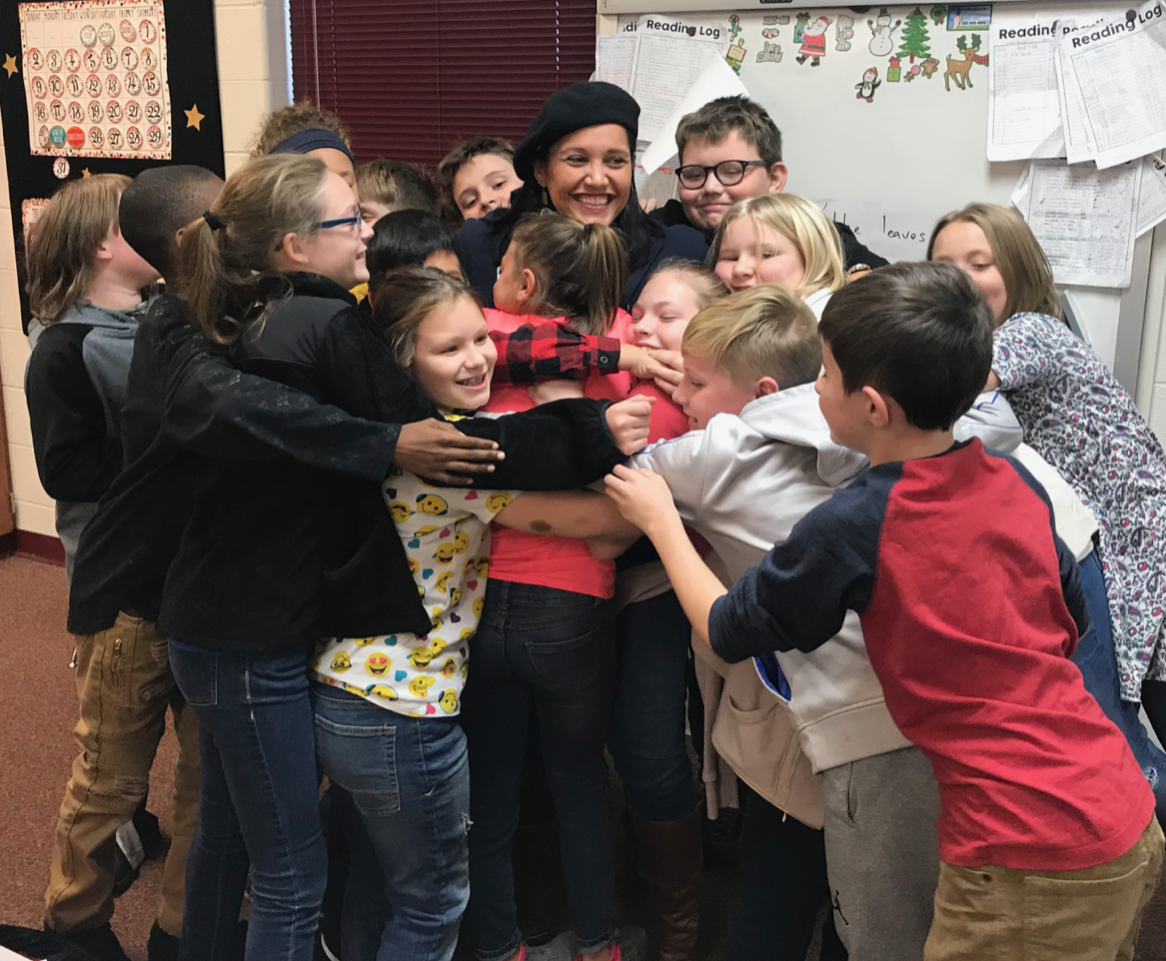
I am fortunate to get the opportunity to pursue both of my passions now; poetry and teaching.
You host the longest-running consecutive weekly open-mic series in the country. Wednesday Night Poetry hasn’t missed a night since February 1, 1989– come snow, floods, or city wide blackouts. How did you first become involved, and what does this project mean to you?
I started going in 2014, and it became like home for me, a place to share my work every week while encouraging me to produce new work.
Over the years, my poetry career sort of took off. But if I didn’t have this safe space, this place to flourish, this nourishing soil in which to bloom, it wouldn’t have.
Here in Hot Springs, I had room to spread my wings and stand out. I emerged as someone that Bud Kenny (the founder) trusted to take our streak and legacy forward. Bud became like a father to me, a father I never really had. We would trade poems and talk about love. He was a real romantic, a tender heart and a crier, a real man’s man, and he listened to me—damn I miss him. In February 2019, at our 30th anniversary, he handed over the reins for me to take over as the new host because he wanted to just be able to come to poetry each week and sit in the back and listen. He got to do that for a few months, until he got sick. He passed away October 2, 2019. Of course, it was a Wednesday. Wednesday Night Poetry means so much to me, especially now as the leader.
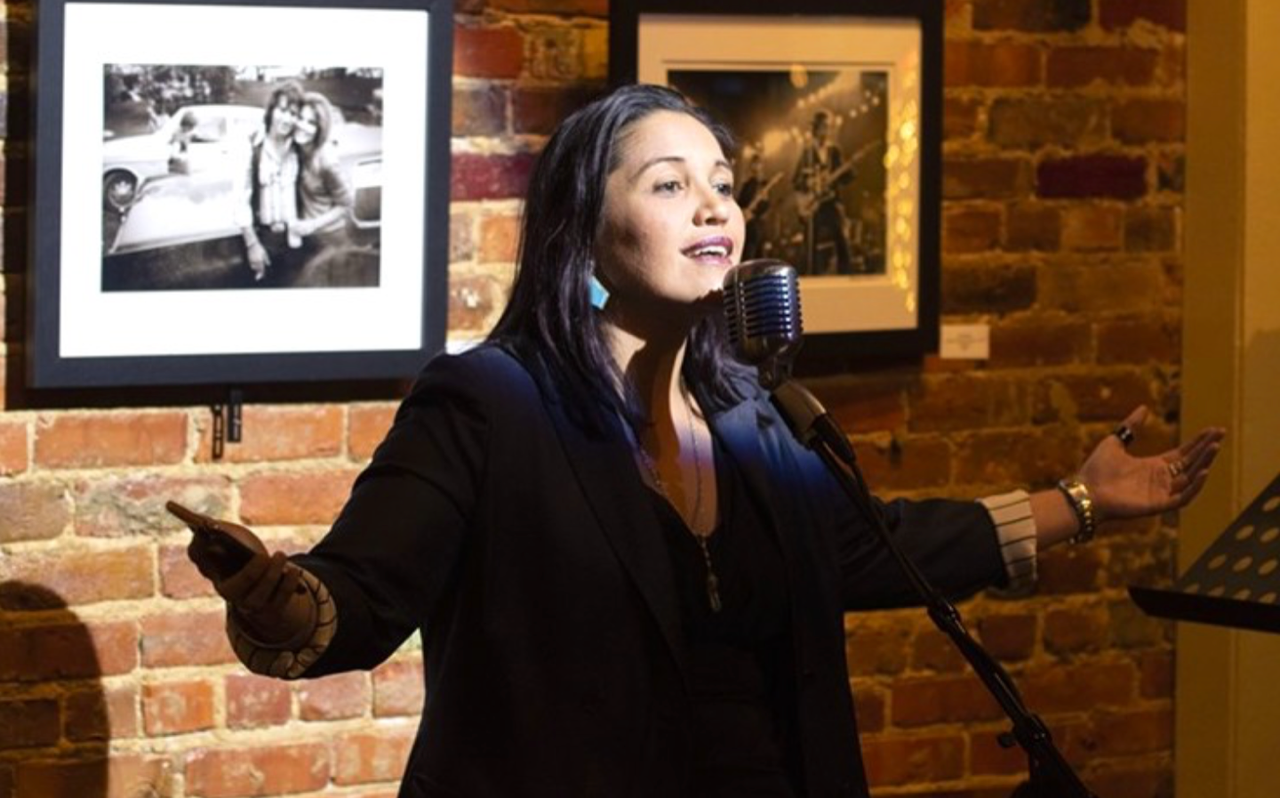
Every week at WNP, Kollective Coffee+Tea in Downtown Hot Springs is packed with poets and open-hearted listeners.
When we last met in person on March 11th, I wish I would’ve hugged everyone a little tighter.
But we persevere. We connect, even in our quarantine. We write, even in our restlessness and stress. We join in our disjoining.
WNP is a safe space, a platform of hope, proof that even in this uncertain time, the bonds of creativity and poetry can remain steadfast and unbroken. Every Wednesday, there will be poetry. This week (April 1) we kick off National Poetry Month. Join us.
Our forty-fourth minute of FaceTime conversation closes; Coggin has soil to play in, poets to elevate, and poetry to write. I find myself wanting to thank her for something I can’t express. She’s given me a present; I’ve only just begun to unwrap it. I don’t know what it is but I know that I am different.
“I have one more question,” I say. “You said you believe in timing and signs. Why?”
She looks up into the sky.
“The universe is always on time—the question is whether you are aligned with that timing.
There are all these little moments, like when you see 11:11 on a clock, or you think of a song and it comes on next. This is Universal Timing, the supermundane. Harmony of a higher design. Most of humanity is asleep and dredging around going back and forth from job to job. The system is designed that way. From the time you’re in school, you’re trained to obey laws and schedules.
But it’s different for me, here in Arkansas, in our woods, on our small slice of land. We don’t play by those rules. We live on our own schedule. The birds wake us up. We have the opportunity to tune in to the frequency of natural things.
Right now, with the virus, we are all seeing just how intensely we are connected. It’s bringing a magnification to how much we unknowingly touch each other. Our cells are on every passing door knob, on every seat, on every subway, plane. We all touch each other but now we are being shown how much touch means. All the fear is making us see the connections we really want back, our true connections, our heart connections. There is a Purpose to all of this, too. A timing.
When I slow down and look at my own life today, I hear the frogs singing at night, harbingers of warmth. The koi fish are unburying themselves from under the leaves at pond bottom. The hummingbirds returned just yesterday! You know how everyone is Zooming for all these virtual meetings everywhere? Well… Zoom into your own life! Here let me show you.”
Kai stands and turns the camera toward a tree bursting with bright pink blossoms.
“Everything is in bloom. Birds are singing. The trees don’t know there’s a virus. The flowers don’t know. Look closely. It’s spring.”
kai coggin
Editor’s Afterword:
The piece above is incomplete without a small crack in the fourth wall. What you just read was supposed to be a straight-up simple interview with an artist I admire. I prepared a list of questions and offered to schedule a phone conversation. Then, we decided to meet “in person” over FaceTime.
My eyes stung eleven minutes into our conversation. I was struck by the love with which Kai spoke about her craft and her students. The ability to alter physical reality through words alone is what writers write for. To listen to a poet describe how she does it, and how she teaches others to do it, is transcendent.
I transcribed and drafted the interview and sent it to Kai to fact-check. She thought it was great, she said, but there wasn’t enough of me in it.
Taken aback, I explained that no artist had ever asked me to mix my voice with theirs in an interview. Kai smiled and said: “see the charm of our conversation was the back and forth, the EXCHANGE of our energies.”
So I returned to write myself in. Kai read it. She wrote herself in. And I returned again. And then her. And then me. And so we created what you just read. This is what happens when hands meet across screens and we follow the impulse to reach.
So, if you’re reading this and there’s someone you’ve been meaning to connect with: reach.
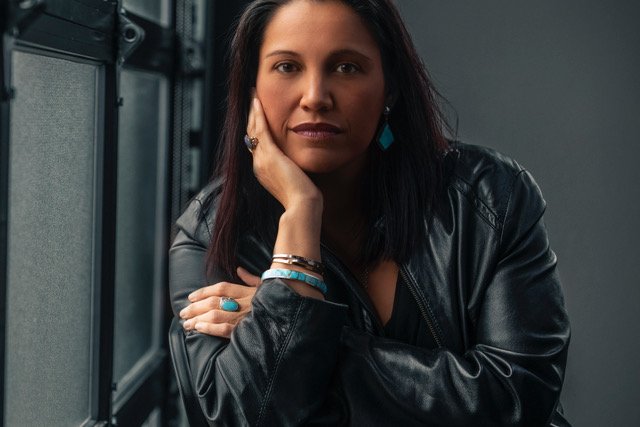
david yerby
In Conversation with Kai Coggin
Billy Lezra

While the world is on lockdown, Kai Coggin casts a poetic spell across screens. “In case you are out there and you are going through this alone, I want to do this for you.” She raises her left hand and moves it toward the webcam. She pauses, eyes bright with affection. “Go ahead. Put your hand up to it.” I raise my hand to touch hers.
“You’re not alone through this. We are all connected, and we’re going to make it through this. In the meantime, let’s get to some poetry.”
Tonight I am a virtual audience member watching the one thousand six hundred and twenty sixth (1,626) consecutive weekly open mic session of Wednesday Night Poetry, a project poet Bud Kenny founded in 1989. Usually the poets meet in person; since COVID-19, Kai is hosting it virtually to keep the streak alive. If you are a poet and want to share some of your work (or a happenstance audience member, like me) this is where you can find the beautiful display of community: WNP Virtual Open Mic: Poetry Through The Pandemic.
I wrote to Kai because I wanted to understand the alchemy of a spirit that compels others to meet her hand through screens, to be vulnerable, to show up for other humans like this.
We meet over FaceTime, both dressed in blue. Sitting outside her home in Hot Springs National Park, Arkansas, she explains that she started writing when she moved from Thailand to the United States at seven. Her parents divorced. She missed her dad. “I wonder if he is thinking about me,” she wrote to herself in a little journal.
She graduated college with a degree in poetry and creative writing, earned a teaching certification, and taught high school English in Houston, where she grew up. For “Romeo and Juliet” she built a balcony on a table in her classroom with foam boards and fake flowers; for Lord of the Flies, she took her students outside to read and gave them aluminum spears.
Her eyes dance the more she talks about teaching.
“How much time do you have?” she asks.
“A lot,” I say.
“Okay.” She smiles. “Because this is a cool story.”

During her fourth year teaching, Coggin led a poetry unit and projected Sandra Cisneros’ “Loose Woman” onto the whiteboard. “This poem is all about stereotypes and if anyone knew about unjustified stereotypes, it was my students.
They groaned when I said we were going to analyze this poem together, but when we read it, something happened that I didn’t expect—engagement.”
(excerpt)
I’m an aim-well,
shoot-sharp,
sharp-tongued,
sharp-thinking,
fast-speaking,
foot-loose,
loose-tongued,
let-loose,
woman-on-the-loose
loose woman.
Beware, honey.
I’m Bitch. Beast. Macha.
¡Wáchale!
Ping! Ping! Ping!
I break things.
The students were enthralled and connected.
Coggin asked them to write their own poems to subvert the stereotypes that had been imposed onto them, just like Cisneros. The project electrified them.

After poetry came the persuasive writing unit. This time Coggin had her students write letters to Sandra Cisneros herself. They asked her to come to their Houston high school to read “Loose Woman.” For many, it was the first time they signed a business letter with their signature. Coggin wrote one, too. She then found the address of Cisneros’ agent and placed each printed letter with each poem on the back. She sent 200 letter/poems from Houston to New York City.
“What did you hear and what did it sound like?” I scrawl in my notes while Coggin talks because to my ears what she describes transcends intuition. She must have heard something, a bell, a whistle, a verse, shoot-sharp, sharp-tongued, sharp-thinking, fast-speaking. How does one know when to put poems in a box?
A month later, after Christmas break, Coggin returned to her classroom to an email from Cisneros.
Her agent received the box of poems, read a few, and boarded a plane to hand-deliver it to Sandra in San Antonio.
Here Coggin mentions timing. “Sandra had been in a grief spiral. Her mother had just died. She wasn’t writing. And out of the blue a box of 200 poems and letters appear that affirm her impact as a writer. It was like a lightning bolt, a sign. She wanted to meet the kids who wrote so raw and real.”
The day Sandra visited the school, Coggin asked her students to dress in their Sunday best.
“They wore little neckties and dresses, and brought home-cooked dishes that represented their cultures. I rented the computer lab for the day and got them out of all their classes.
They read their poems to Cisneros. Sandra read “Loose Woman” to them. It was a beautiful culmination. Divine.

There was a film crew that captured the whole thing. Cisneros even brought 200 copies of her new novel, Caramelo, and signed books for each student.
She cried. For most of the kids, this was the first hard-back book they could call their own.”

“Are you crying?” Coggin asks me while I blink fast and hope she doesn’t notice over pixelated Facetime. She notices.
“Yeah, dude! That shit is so wild!” I say, embarrassed.
She smiles and laughs big. “No, dude. Wait for it.”
She tells me that Cisneros recognized the poet in her. She invited Kai to her San Antonio writer’s workshop MACONDO, and to her famous pink house. That night she cooked her quesadillas and they shared a corona in her kitchen amidst the walls draped with Mexican folk art.
Eventually Sandra wrote a blurb for Kai’s first full-length collection PERISCOPE HEART calling Coggin’s poetry “spells, chants, prayers, invocations… work of the spirit, illuminations like desert thunder and a night sky of benedictions.”

What began as a poem on the whiteboard moved through time and transfigured into Sandra Cisneros herself in the classroom. “And that’s why I stopped teaching,” Coggin says.
“The impact of poetry was undeniable. I saw its power and observed what it did for my kids in Houston. These ‘thugs’ (as society calls them) brought Sandra Cisneros to their classroom. It gave them so much faith in their own words. The thing I’d put on the back burner resurfaced and put itself magically on the frontburner. Poetry.”
That year, Kai was named a finalist for Regional Teacher of the Year, out of 85,000 teachers in the city of Houston.

“Poetry was calling me.
I told my kids I had a dream to chase, and they cheered me on. My partner Joann always encouraged my creativity, and gave me the support to take a huge risk in leaving my stable job and great salary. We left Houston and moved to Arkansas. And here, I’ve been able to just focus completely on writing. Nature is so conducive. Joann is a painter. She is a master naturalist who ushers in all the birds and flowers I observe. I turn them into poems. I do the shoveling; she plants the seeds. She’s blowing a kiss at me right now.”
She looks up with a huge smile and waves.
Coggin later sends me a close-up picture of Joann whose blue eyes are fixed on a hummingbird in flight one foot away from her face. The adoration shimmers between photographer and subject, subject and tiny bird.

kai coggin
How would you describe your creative process?
When my heart fills up and I can’t hold something in there anymore, I write. When my heart breaks for some cruel injustice, I write. When my heart longs, I write. When my heart is bursting with love or sex or joy or transcendence, I write. I have no real process, I guess, no rigorous schedule of drafting and editing, if I think about it. I go with the flow of the infinite swirling around me. For lack of a better metaphor,
I make myself an instrument of the cosmos, letting energy move through me into poetic form. I transcribe the human experience, the humble path of the seeker, the pitfalls and the triggers, the defeats and victories of attaining self-awareness.

I used to write in the morning, when my love and our two pekingese Genghis & Layla were still sleeping. It was my church, my coming to self, my reflection, and meditation, and searching. I would find poems in the morning news, the way the world woke up in stories. I would dig for meaning, for the divine traces in random facts and articles. Once a poem came from the fact that parrotfish poop creates all the white sand on the beaches in the world.
This is sort of like mining for stardust amidst the rubble of the world, an exercise in wonder, revealing the esoteric in the ordinary.
Sometimes a phrase or an image will strike me and I will turn it over and over in my head, knowing there is a poem there. It will marinate and I will ruminate on it until it finds its cling into the tangible, until I find a way to voice the beauty or tragedy of it into poem.
Lately though, I have emerged as a Warrior Poet.
In the last few years after the 2016 election, things are just too volatile, too much daily travesty to digest, too much innocence robbed and too much light snuffed out by greed and evil. My peaceful morning respite into poetry has become a fiery necessity to illuminate the injustices that are unfolding daily in the world, to call out the violators of goodness.
My creative process follows the battle now. My poet warrior cry rises almost daily to fight with my words, whether it is on a FB post, on a mic, in a classroom, in a poem. Inside, I am writing the poem of myself, and how I can stand as Light in the unfolding darkness and chaos of our times. That is my purpose— my church, my coming to self, my reflection, and meditation, and searching. To be Light. To be INCANDESCENT.

I am struck by the ways in which the titles of your bodies of work speak to each other and move into flight and fire: PERISCOPE HEART into WINGSPAN, to SILHOUETTE and finally INCANDESCENT. How would you describe your artistic trajectory since you published PERISCOPE HEART?
PERISCOPE HEART was my first step into the world poetically. My spirituality and soul-striving and body image and love and life are seen through the eyes of my heart.
When I see through the eyes of my heart, it acts as a periscope wherein it “lifts me” above and over the physicality of the mundane human existence, and sort of puts me in this higher sphere.
That was an image that kept coming to me as I compiled that first manuscript.
With WINGSPAN, I was wide open, feeling everything through and through. I felt as though I was soaring in my creativity and purpose. And the cool thing about this book is when you open the book, THE WINGS OPEN. I always tell my audiences and classes that when I do a reading or teach a class of kids. I open the book, and show them the neat visual trick, and usually they are quiet. Then I say, ‘oh come on, isn’t that cool? Can I get a little more reaction, some oooohs and ahhhhs, a whoa oh my god! Ok, rewind, let’s try it again, okay?’ Then I spin around and I do the whole thing again— ‘and the cool thing about THIS book, is when you open the book, THE WINGS OPEN!’ And they scream and holler and clap and ooh and ahhh. I make them oooh and ahh. It’s super corny as hell, but breaks the ice. I even did it in Chicago featuring at The Green Mill for 300 people and in NYC when I was book touring. Joann was like don’t do the wing thing in New York, don’t do the wing thing… but I did the wing thing, and it killed.

SILHOUETTE is a spoken word album I produced in GarageBand. I recorded readings of 17 poems, and asked my musician friends across the country to play their original sounds in the background as they listened. It meshed all so beautifully, and I proved to myself that I can do anything I earnestly set out to do.
With INCANDESCENT…the world is dark. Incandescent is my beauty and battle cry.

(excerpt)
… glowing
growing
giving off light
light
light
in whatever form
I can
incandescent
means
emitting light as a result of being heated
and isn’t everything heated
and isn’t everything shamefully ablaze
and isn’t everything burning before us
and isn’t the whole wide world turning to ash
can we still find the light in all that is being lost
can we still project a vision that leads humanity forward
can we still search out beauty in the rubble
can we still shine amidst the trouble
can we name ourselves luminous
and believe it
we must
we do
if you recognize this is how you move through life
you are incandescent, too.
What would you say to someone who doesn’t think their words matter?
Your words matter to me.
Do you ever miss teaching?
For the last four years, I have worked with the Arkansas Arts Council and Arkansas Learning Through the Arts, as a Poetry Teaching Artist.

I get to bounce around to these different schools and show students that they can actually have a career as an artist. You can be a dancer, or a painter, or a poet, like me. You can write about all the experiences you are going through. Poetry is a safe place for your feelings. In every classroom, that is my mantra:
POETRY IS A SAFE PLACE FOR YOUR FEELINGS.
And they see they are safe with me; their words, their stories, their hearts. Safe.

I try to be that person who comes in like a lightning bolt of hope to classrooms that are forgotten, like in rural Arkansas or in the Delta.
Arkansas has some of the highest rates of poverty and PTSD in children. I give them a way to express that. A window. I bring in poems that engage the students with their relevance. Kids and teens are inundated with poems written by the “old dead white guys” of the literary canon. I always tell them “I am not going to read poems by old dead white guys: the poems we are going to read are written by your reflections.” Poets of color. Rural poets. If I have a class of mostly Latinx students, we read Latinx poets who are writing TODAY. They can see that their lives, too, can transmute into poetry, and all of a sudden these kids have a new tool they can use for the rest of their lives.

I am fortunate to get the opportunity to pursue both of my passions now; poetry and teaching.
You host the longest-running consecutive weekly open-mic series in the country. Wednesday Night Poetry hasn’t missed a night since February 1, 1989– come snow, floods, or city wide blackouts. How did you first become involved, and what does this project mean to you?
I started going in 2014, and it became like home for me, a place to share my work every week while encouraging me to produce new work.
Over the years, my poetry career sort of took off. But if I didn’t have this safe space, this place to flourish, this nourishing soil in which to bloom, it wouldn’t have.
Here in Hot Springs, I had room to spread my wings and stand out. I emerged as someone that Bud Kenny (the founder) trusted to take our streak and legacy forward. Bud became like a father to me, a father I never really had. We would trade poems and talk about love. He was a real romantic, a tender heart and a crier, a real man’s man, and he listened to me—damn I miss him. In February 2019, at our 30th anniversary, he handed over the reins for me to take over as the new host because he wanted to just be able to come to poetry each week and sit in the back and listen. He got to do that for a few months, until he got sick. He passed away October 2, 2019. Of course, it was a Wednesday. Wednesday Night Poetry means so much to me, especially now as the leader.

Every week at WNP, Kollective Coffee+Tea in Downtown Hot Springs is packed with poets and open-hearted listeners.
When we last met in person on March 11th, I wish I would’ve hugged everyone a little tighter.
But we persevere. We connect, even in our quarantine. We write, even in our restlessness and stress. We join in our disjoining.
WNP is a safe space, a platform of hope, proof that even in this uncertain time, the bonds of creativity and poetry can remain steadfast and unbroken. Every Wednesday, there will be poetry. This week (April 1) we kick off National Poetry Month. Join us.
Our forty-fourth minute of FaceTime conversation closes; Coggin has soil to play in, poets to elevate, and poetry to write. I find myself wanting to thank her for something I can’t express. She’s given me a present; I’ve only just begun to unwrap it. I don’t know what it is but I know that I am different.
“I have one more question,” I say. “You said you believe in timing and signs. Why?”
She looks up into the sky.
“The universe is always on time—the question is whether you are aligned with that timing.
There are all these little moments, like when you see 11:11 on a clock, or you think of a song and it comes on next. This is Universal Timing, the supermundane. Harmony of a higher design. Most of humanity is asleep and dredging around going back and forth from job to job. The system is designed that way. From the time you’re in school, you’re trained to obey laws and schedules.
But it’s different for me, here in Arkansas, in our woods, on our small slice of land. We don’t play by those rules. We live on our own schedule. The birds wake us up. We have the opportunity to tune in to the frequency of natural things.
Right now, with the virus, we are all seeing just how intensely we are connected. It’s bringing a magnification to how much we unknowingly touch each other. Our cells are on every passing door knob, on every seat, on every subway, plane. We all touch each other but now we are being shown how much touch means. All the fear is making us see the connections we really want back, our true connections, our heart connections. There is a Purpose to all of this, too. A timing.
When I slow down and look at my own life today, I hear the frogs singing at night, harbingers of warmth. The koi fish are unburying themselves from under the leaves at pond bottom. The hummingbirds returned just yesterday! You know how everyone is Zooming for all these virtual meetings everywhere? Well… Zoom into your own life! Here let me show you.”
Kai stands and turns the camera toward a tree bursting with bright pink blossoms.
“Everything is in bloom. Birds are singing. The trees don’t know there’s a virus. The flowers don’t know. Look closely. It’s spring.”
kai coggin
Editor’s Afterword:
The piece above is incomplete without a small crack in the fourth wall. What you just read was supposed to be a straight-up simple interview with an artist I admire. I prepared a list of questions and offered to schedule a phone conversation. Then, we decided to meet “in person” over FaceTime.
My eyes stung eleven minutes into our conversation. I was struck by the love with which Kai spoke about her craft and her students. The ability to alter physical reality through words alone is what writers write for. To listen to a poet describe how she does it, and how she teaches others to do it, is transcendent.
I transcribed and drafted the interview and sent it to Kai to fact-check. She thought it was great, she said, but there wasn’t enough of me in it.
Taken aback, I explained that no artist had ever asked me to mix my voice with theirs in an interview. Kai smiled and said: “see the charm of our conversation was the back and forth, the EXCHANGE of our energies.”
So I returned to write myself in. Kai read it. She wrote herself in. And I returned again. And then her. And then me. And so we created what you just read. This is what happens when hands meet across screens and we follow the impulse to reach.
So, if you’re reading this and there’s someone you’ve been meaning to connect with: reach.

david yerby
